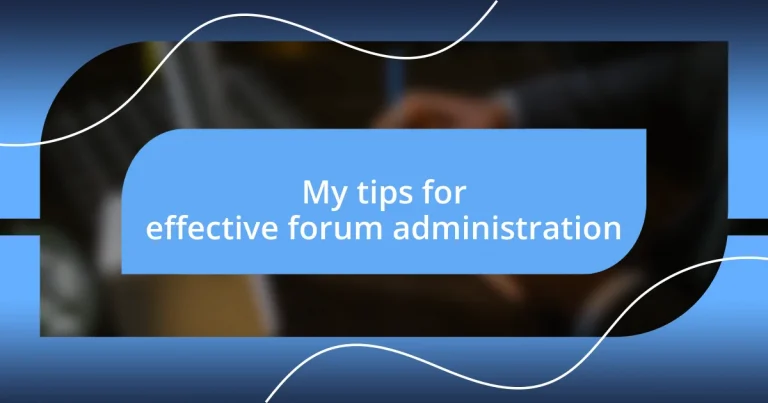Key takeaways:
- Effective forum administration involves fostering community, balancing moderation with member engagement, and understanding diverse needs.
- Setting clear, shared goals and regularly revisiting them enhances member participation and ensures the forum remains relevant and engaging.
- Handling conflicts through open communication and establishing clear guidelines promotes a respectful and supportive environment among members.
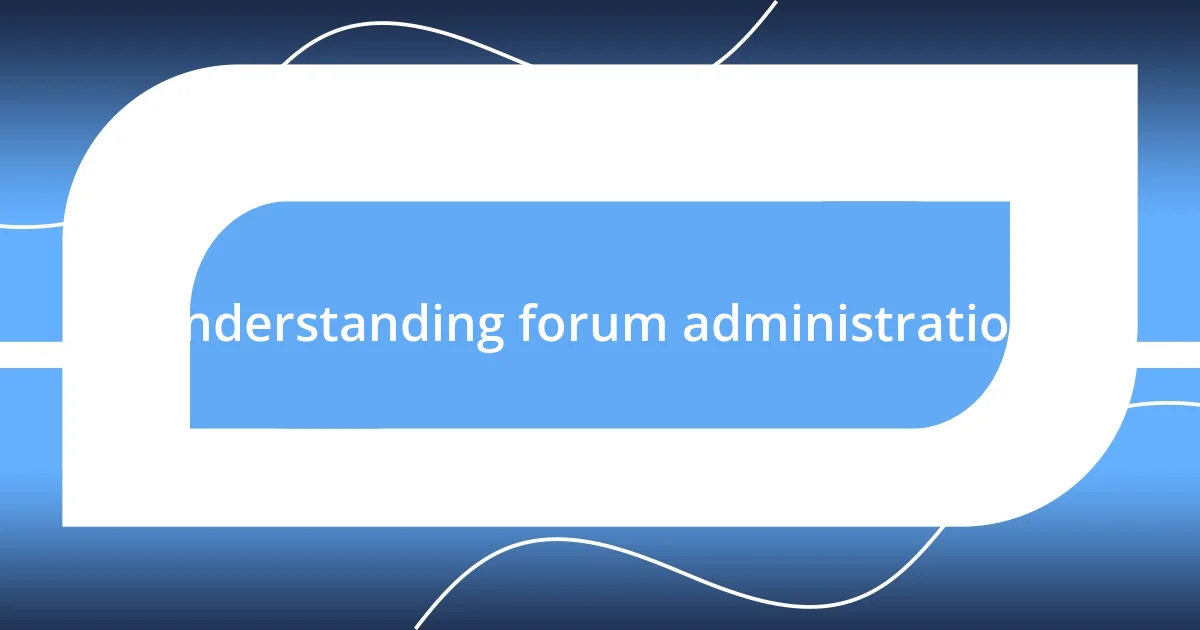
Understanding forum administration.
Understanding forum administration goes beyond mere management; it’s about fostering a sense of community. I remember stumbling into my first forum as a newbie, feeling both excited and overwhelmed. It hit me then that a good administrator doesn’t just enforce rules; they create an inviting atmosphere where members feel valued and heard.
A big part of this role involves navigating the delicate balance between moderation and engagement. Have you ever had to edit a post that crossed the line? It’s a challenging moment; you want to maintain order while also respecting the author’s feelings. I’ve been there, and I learned the importance of clear communication—explaining why a decision was made fosters trust rather than resentment.
Moreover, understanding the diverse needs of members is crucial. Each participant brings their own perspectives, and this diversity enriches discussions. I often found that taking a step back to listen first gave me invaluable insights. It’s amazing how much more effective forum administration becomes when you truly consider the voices within your community.
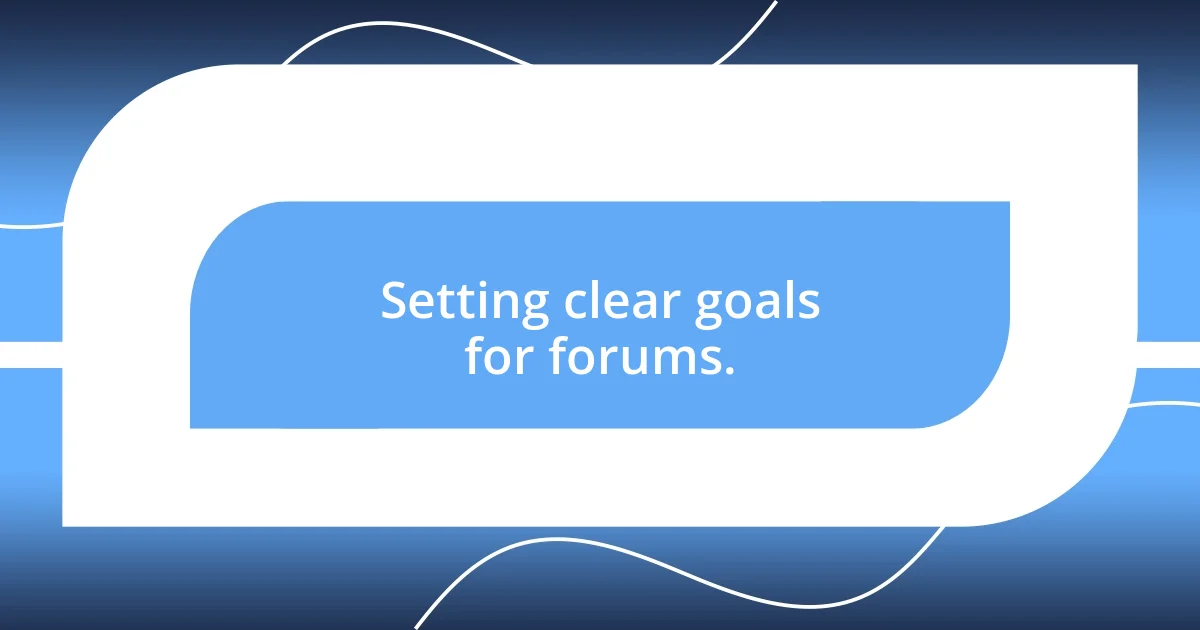
Setting clear goals for forums.
Setting clear goals for forums is essential for creating a focused and engaging environment. When I started managing my first forum, I quickly realized the value of having specific objectives. Without clear goals, the conversations can drift aimlessly, leaving members feeling lost and unmotivated. I found that laying out a vision—whether it was fostering discussions about a niche topic or facilitating member collaborations—helps everyone understand their role in the community.
In my experience, it’s also important to share these goals with the community. I remember drafting a post that outlined our objectives, and the response was overwhelmingly positive. Members appreciated knowing what we were striving to achieve together. This transparency not only fosters a sense of teamwork but also encourages members to contribute actively towards achieving these common goals, creating a more vibrant forum.
Another aspect I’ve found valuable is regularly revisiting and adjusting those goals. It’s natural for communities to evolve, and what worked initially may no longer resonate. I once led a poll asking members for their feedback on our goals, which revealed new interests that I had overlooked. Adapting based on member input ensures that goals remain relevant and engaging, ultimately leading to a more dynamic and successful forum.
| Goal Type | Description |
|---|---|
| Engagement | Encouraging active participation through discussions and activities. |
| Community Building | Fostering relationships and a sense of belonging among members. |
| Moderation | Establishing rules and guidelines to maintain a respectful atmosphere. |
| Content Focus | Defining the specific themes or topics the forum will cover. |
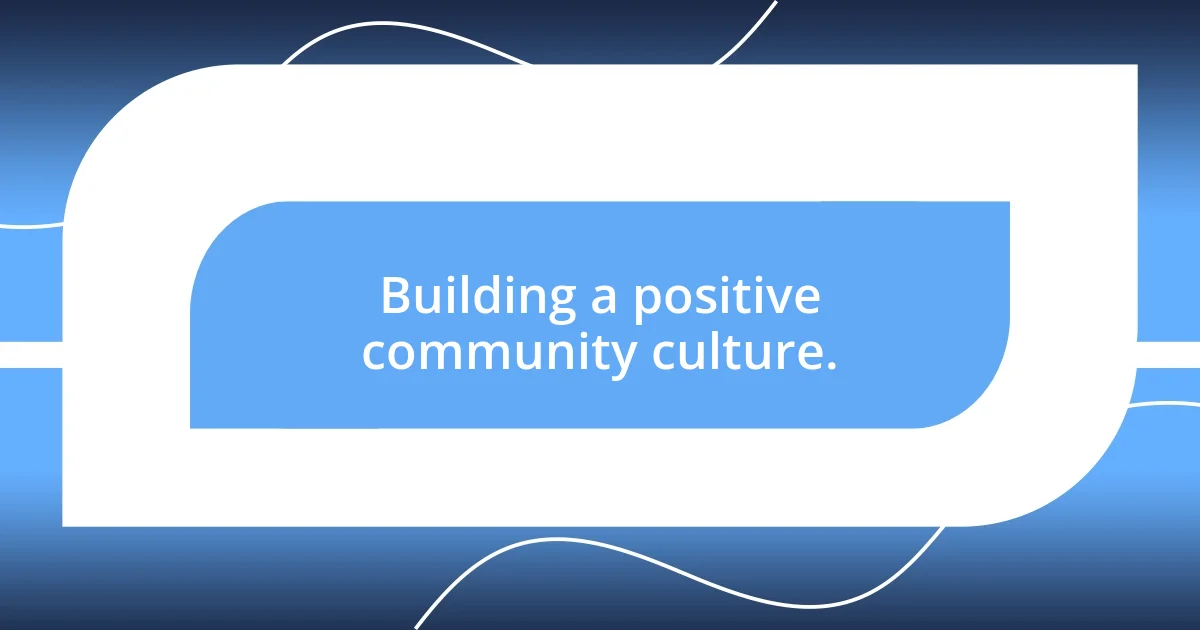
Building a positive community culture.
Building a positive community culture is pivotal in creating an engaging forum environment. I recall when I introduced a “Member Spotlight” series to my community. It not only made individuals feel appreciated but also encouraged others to share their stories and passions. This initiative fostered camaraderie and established a sense of belonging that transformed our forum into a vibrant social hub.
To cultivate this positive culture, I often emphasize the importance of shared values and collective responsibility among members. A few effective strategies I’ve employed include:
- Welcome New Members: Make a concerted effort to greet newcomers. A simple “hello” can make them feel noticed and valued.
- Celebrate Achievements: Whether it’s a personal milestone or community achievement, celebrating together strengthens bonds.
- Encourage Kindness: Establishing norms around respectful communication sets the tone for interactions.
- Host Community Events: Organizing events or challenges encourages participation and builds relationships.
- Facilitate Open Discussions: Create spaces for members to voice their thoughts and feelings openly. Listening shows that you care.
By integrating these practices, I’ve seen firsthand how they create an inviting environment where members feel empowered to contribute positively.
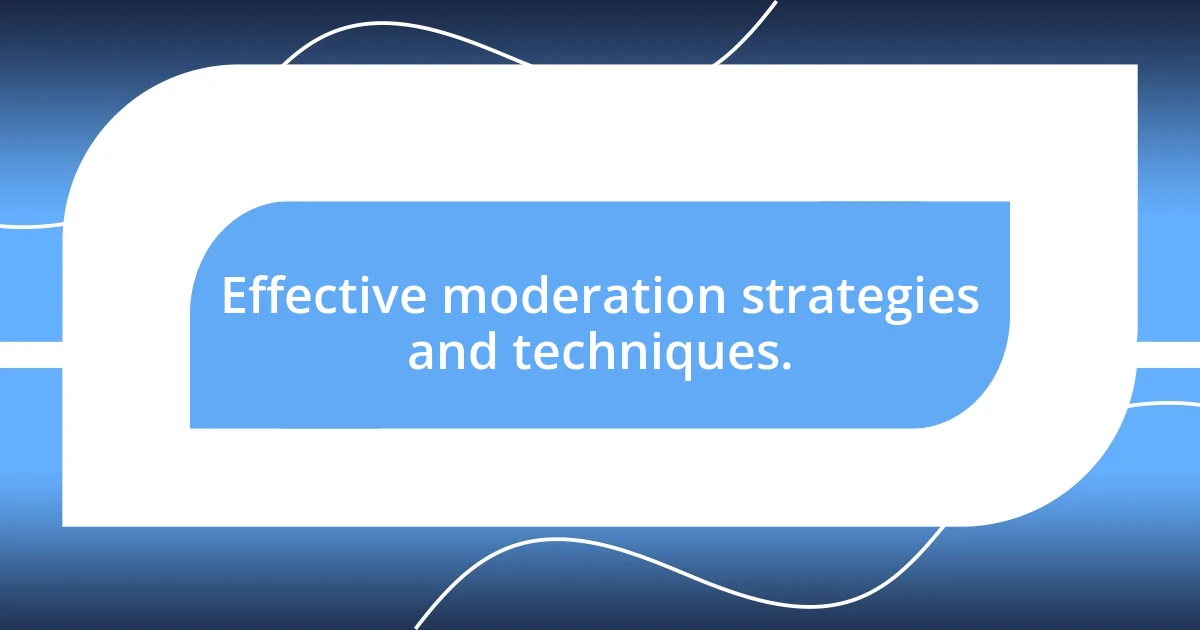
Effective moderation strategies and techniques.
One effective moderation strategy is to implement proactive engagement techniques. I remember when I tried a new approach by initiating daily discussion threads that aligned with our community’s interests. This not only sparked lively conversations but also made it easier for quieter members to jump in. By creating these avenues for interaction, I noticed that more people were willing to share their thoughts—after all, who doesn’t appreciate a prompt to get the ball rolling?
Another technique that’s worked wonders for me is establishing clear moderation guidelines. Early on, I realized the importance of setting expectations for behavior. I developed a brief set of rules that clearly outlined what was acceptable and what wasn’t. When members feel secure in a structured environment, they’re more likely to engage positively. I’ve witnessed how simply setting those boundaries curbed negativity, leading to healthier discussions where everyone felt empowered to share their opinions without fear of backlash.
Finally, I’ve found that regular feedback loops with the community can dramatically enhance moderation effectiveness. I once conducted a series of surveys to gauge member satisfaction with moderation practices. The insights I gathered were enlightening; some members had great suggestions for improvement. Engaging your community in this way not only fosters transparency but also makes members feel valued— isn’t that what we all want in a thriving forum?
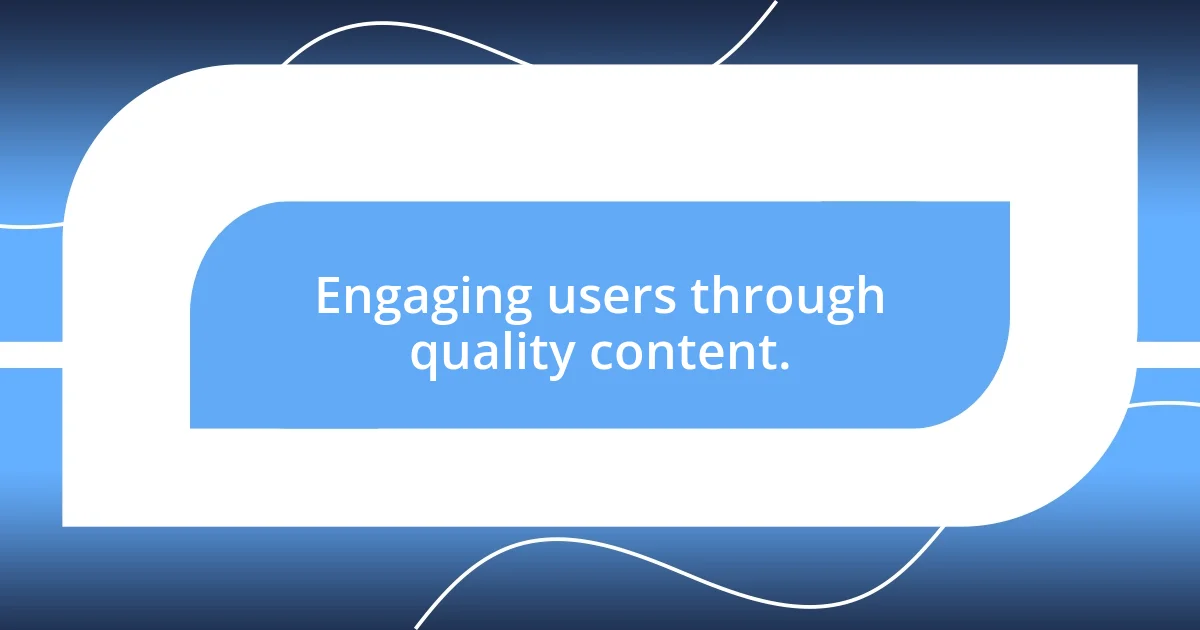
Engaging users through quality content.
Creating quality content is essential for keeping forum users engaged. I’ve found that sharing diverse and relatable topics invites more discussions. One time, I wrote about a common challenge many members faced, and the flood of responses was astonishing. Suddenly, it felt less like a monologue and more like a vibrant conversation, where everyone shared their solutions and experiences. Isn’t it interesting how addressing a shared struggle can foster a sense of community?
I also emphasize the value of well-researched and informative posts. For instance, I dedicated time to create a comprehensive guide on a trending topic in our field. The feedback I received was overwhelmingly positive—members appreciated the effort and expressed how the content not only informed them but also sparked further questions and discussions. This reiterates my belief that quality content can act as a catalyst for more profound engagement. Don’t you think that when users feel informed, they’re more inspired to contribute?
Lastly, I try to infuse a bit of personality into my posts. One memorable moment was when I shared a personal story related to a forum topic. I presented my challenges in a lighthearted way, which not only made others laugh but also encouraged them to open up about their experiences. It’s this blend of authenticity and actionable insights that I believe draws people in. Wouldn’t you agree that when content resonates emotionally, it’s more likely to spark engagement?
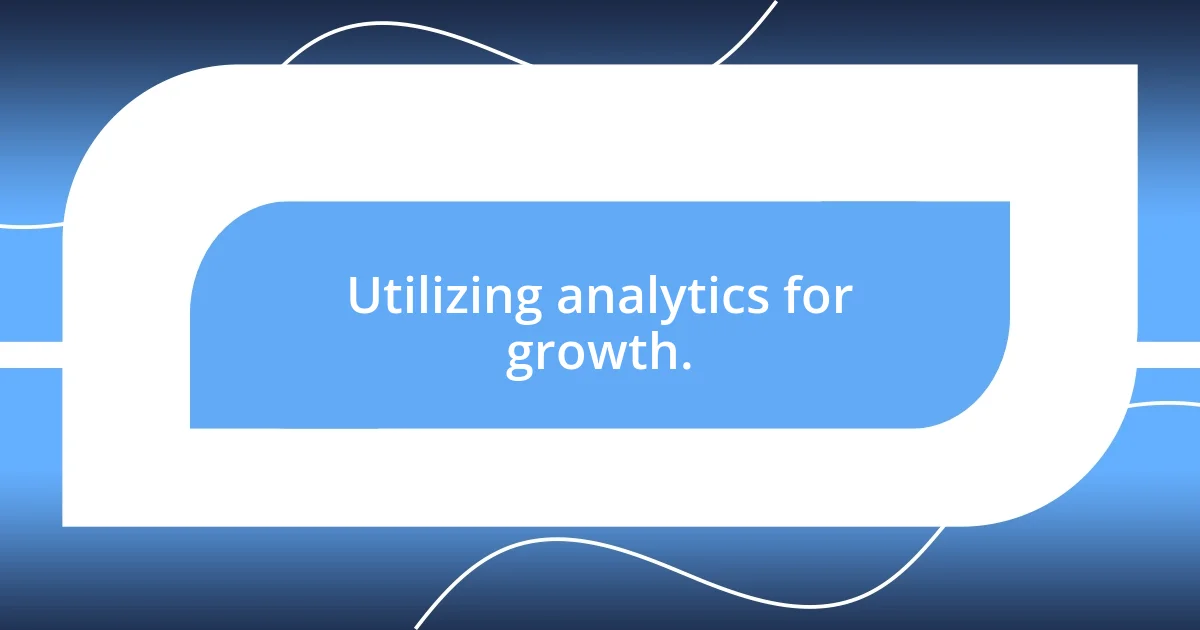
Utilizing analytics for growth.
Utilizing analytics has been a game-changer for my forum management. I closely monitor user engagement stats, like post views and response rates, to identify what’s resonating with my community. For instance, when I noticed a spike in activity around a specific topic, I decided to create a series that delved deeper into it, and wow, did the discussions explode! Isn’t it fascinating how data can guide your content strategy?
One of my favorite tools is Google Analytics. Using it, I once discovered that our forum experienced significant traffic during particular times of the day. By aligning my posting schedule with these peak times, I was able to capitalize on that traffic, drawing in more active participants. It’s incredible how small adjustments, guided by analytics, can yield such noticeable increases in engagement. Have you ever tried adjusting your schedule based on user insights?
Another aspect I find essential is tracking member participation over time. I created a simple spreadsheet to record contributions from various users, allowing me to recognize and celebrate our most active members. Doing so fostered a greater sense of community; I could personally thank them for their involvement, creating an inviting atmosphere. I think it’s vital for forum administrators to leverage analytics in this way—after all, who doesn’t appreciate a little recognition for their efforts?
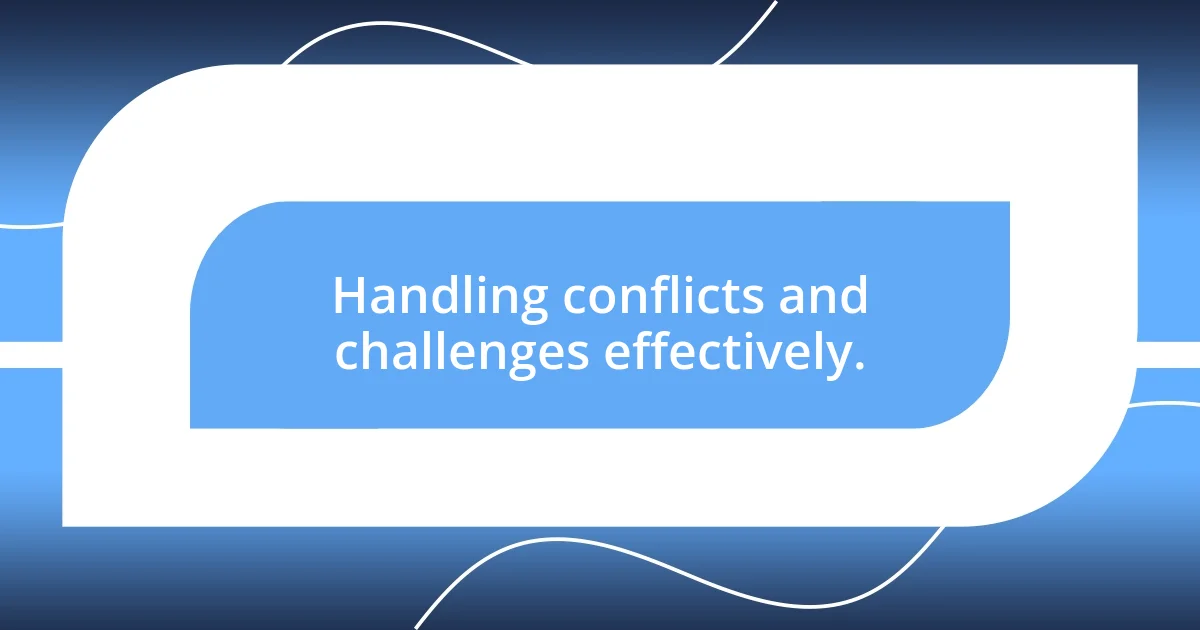
Handling conflicts and challenges effectively.
Handling conflicts in forum administration can often feel daunting, but I’ve found that addressing issues head-on is crucial. One time, a heated disagreement erupted over a member’s post, and rather than letting it simmer, I facilitated an open dialogue. By encouraging everyone to voice their perspectives respectfully, we didn’t just resolve the issue; we built a more robust community. Have you ever seen how open communication can turn a conflict into an opportunity for growth?
Challenges also arise when dealing with misunderstandings. I recall a situation where two users misinterpreted each other’s intentions, leading to escalating tensions. Instead of taking sides, I stepped in to clarify the context behind their words. This approach not only diffused the situation but also deepened mutual respect among the members. Isn’t it enlightening how just a little mediation can pave the way for greater understanding?
Moreover, setting clear guidelines has been invaluable in my experience. I remember when I implemented a code of conduct that articulates expected behavior and conflict resolution procedures. This proactive step shifted the atmosphere from reactive to preventive; members now had a clear avenue for addressing grievances before they escalated. Isn’t it empowering for users to know there’s a framework in place that prioritizes fairness and respect?












